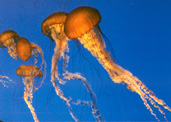Later today, NPR has promised us an All Things Considered story on swarming jellyfish. Of late they’ve been a problem in Hawaii, North Carolina, and to Japan’s nuclear reactors:

A mass of jellyfish proved an unlikely thorn in the side of the Japanese nuclear industry this week when they choked a pipe, which feeds cooling water into a coastal plant.
The output from the Hamaoka reactors was slashed by 30 to 40% after the cooling system automatically shut down, returning to full power about three hours later once workers had cleared the jellyfish blockage. This was the first time jellyfish have affected power generation in Japan.
(We know where this leads.)
We here at Mother Jones have been obsessed with the attack of the killer (or at least really, really painful) jellies for the last several years, ever since we heard that in 2000, swarms of 25-pound jellyfish native to Australia invaded the Gulf of Mexico. So numerous were these Australian invaders, that the shrimp fishermen of the Gulf lost a lot of their harvest because the jellies weighed down their nets.
Jelly invasions appear to be yet another result of human-induced global climate change. (More instances of jellie invasions can be found here and here.) Changes to seawater’s salinity or Ph levels cause jellies and other species to migrate far beyond their historic range. And tropical storms and hurricanes, which are increasing in number and severity due to climate change, can also reroute the jellies, as just happened in the Carolinas. Also, one of the jellies’ main predators, turtles and tortoises, are being decimated, thanks to overfishing, pollution, and the like. (For more on all these issues see Julia Whitty’s piece on the fate of the ocean and the rest of our ocean package.)

According to this story, a new study out of Woods Hole Oceanographic Institute reports that tiny jellyfish-like creatures called salps are helping get rid of some carbon dioxide by “transporting tons of it daily from the ocean surface to the deep sea and preventing it from re-entering the atmosphere and contributing again to the
Which seems like great news, until you realize that way salps do this is by digesting huge amounts of phytoplankton, and as Whitty reports, these plankton, which are the foundation of all life in the sea, are also at risk from warming waters and changing salinity and Ph.
In other words, a potential check on global warming is being threatened by…global warming.


















